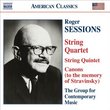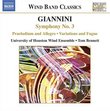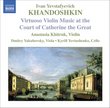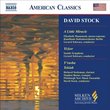SEREBRIER RECORDS MORE ROREM PREMIERES
M.W. | Seattle, Washington | 05/16/2006
(5 out of 5 stars)
"Following on the steps of his memorable recording of the Rorem three symphonies (two of them world-premiere recordings) José Serebrier gives us now the world premiere of Rorem's string
orchestra masterpiece, "PILGRIMS", a gem that should attain the notoriety of Samuel Barber's famous "Adagio for Strings", and the first recording of Rorem's new Flute Concerto, recently premiered by the Philadelphia Orchestra and Jeffrey Khaner, who is the soloist in this CD. Jeffrey Khaner is the solo first flute of the venerable Philadelphia Orchestra.
José Serebrier makes the Royal Liverpool Philharmonic sound
full and warm in the string piece, and absolutely accurate and razor-sharp in the accompaniment of the two concertos. It's hard to imagine a better performance. Obviously the Royal Liverpool Philharmonic is a first-class orchestra, but it takes a master like Serebrier to bring out all their potential. The Flute Concerto is masterfully played by Khaner, who obviously knows every nuance and every note in his heart and mind. He gives a truly spectacular, virtuoso performance. The variety of sound and colors is amazing. The work itself, a sequence of several movements in the form of a suite, is quite different in style and character from the older Violin Concerto, (which was previously recorded by Gidon Kramer and Leonard Bernstein with the New York Philharmonic).
The Violin Concerto in the Naxos CD has the advantage of the soloist, the young Russian-American Philippe Quint, who surpasses Kramer by a long shot, in articulation, musicality, even intonation. It sounds like an incredibly difficult work,
but Quint manages to make it sound easy and even simple. We heard him previously in the memorable recording of the beautiful Concerto by the American composer William Schuman, with José Serebrier conducting the Bournemouth Symphony Orchestra, (which perhaps was Quint's debut recording). The Rorem performance is even better sounding, which is remarkable, considering that the CD of the Schuman is truly exceptional. Quint sounds now more assured. Obviously he has known the Rorem Violin Concerto for a long time.
"Pilgrims" give the strings of the RLP the opportunity to shine under Serebrier's inspired direction. He manages to obtain a Stokowskian string tone and glow, the sort of sound quality that hasn't been heard on disc since Stokowski. The work and the performance are a delight.
All three works are quite different in character, while the Rorem style and spirit remain recognizable in each. The orchestrations are brilliant and the writing for the solo instruments obviouslly challenging, but extremely idiomatic. It's the kind of recording one wants to hear again and again.
This is one of the most rewarding recordings of new music I have heard in years.
R. Richardson
"
Who knew Rorem's non-vocal music was so wonderful?
J Scott Morrison | Middlebury VT, USA | 05/20/2006
(5 out of 5 stars)
"You can guess from this review's title that it will be a rave. Until I heard Rorem's symphonies (also on Naxos) a couple of years ago, I had no idea that Ned Rorem could write so beautifully for orchestra. Well, I did know, too, because years ago there were recordings of some of his tone poems (String Symphony, Sunday Morning, Eagles -- Louis Lane, Atlanta Symphony) but that was long enough ago that it had slipped from memory. Since hearing this CD I pulled them out and reveled in their beauty, too. On this disc we have two concerti that are entirely engaging, the Flute Concerto and the Violin Concerto, and for 'filler' another tone poem, 'Pilgrims' (for string orchestra).
Pride of place goes to the alluringly beautiful Flute Concerto. Written for and played here by the principal flutist of the Philadelphia Orchestra, Jeffrey Khaner, it is a collection of six movements that have little to do with classical concerto forms; Rorem himself says it could just as properly be called a suite (and the same applies to the Violin Concerto). Taking his inspiration partly from the flute music of the impressionists, particularly Debussy, we hear music of many moods. The separate movements have more or less arbitrary titles -- implying but not really outlining some sort of narrative. Rorem has said that no matter what kind of music he is writing he always has silent song lyrics in mind -- 'words that are not there' -- and this gives his music both a narrative feel and a rhapsodic construction. For me the two movements that I connected with most are 'Leaving-Traveling-Hoping' with its pastoral calm, and 'False Waltz' with its repeated timpani figure and skittering flute. (Interestingly, there is a movement in the violin concerto that also has a repetitive timp figure as a kind of chaconne bass.) Khaner, whose name I knew but whose solo work I didn't, is a nonpareil flutist. I particularly like that he doesn't have the fruity vibrato so commonly heard from European flutists. Still, he has numerous tone colors at his disposal; not an easy thing with an overtone-poor instrument like the flute. I am eager to hear more from him.
The Violin Concerto is from 1985 and has previously been recorded by Gidon Kremer, a recording I have not heard. Rather more expressionistic that the Flute Concerto, it too is a six-movement suite rather than a classic concerto. Phillippe Quint, whose recording of William Schuman's violin concerto I quite liked, is a marvelous advocate for this virtuosic work. Still, I am less struck by this concerto than the Flute Concerto, which I feel confident will enter the repertoire.
The 'filler' is Rorem's 1959 'Pilgrims' which doesn't refer to America's founding fathers but takes its title from a passage in Hebrews (11:13) and actually was prompted by a passage quoting that verse in Julien Green's novel 'Le voyageur sur la terre' (we will remember that Rorem lived in France a number of years and is an ardent Francophile). For string orchestra and lasting about seven minutes, it is elegiac and richly harmonized with much use of divisi strings.
The performances here could hardly be bettered. Jose Serebrier, who earlier recorded the three Rorem symphonies with the Bournemouth Symphony, conducts the excellent Royal Liverpool Philharmonic in idiomatic and persuasive accounts of this music. He also contributes the helpful booklet notes.
Enthusiastically recommended, particularly for the Flute Concerto.
Scott Morrison"
Another Fabulous Rorem Disc
D. A Wend | Buffalo Grove, IL USA | 08/15/2006
(5 out of 5 stars)
"Naxos has issued another excellent CD is what is becoming a Ned Rorem cycle. This CD opens with a short work called Pilgrims, written for string orchestra. The subject of the music has nothing to do with the founding pilgrims but was based on a Bible verse from Hebrews. The mood is one of reflection, not sad but one of recalling things that were not attained. The Flute Concerto was written in 2002 but is more of a suite than a concerto. It was written on a commission from the Philadelphia Orchestra for their principle flautist Jeffrey Khaner, who performs the piece here. The six movements bear the names: The Stone Tower, Leaving-Traveling-Hoping, Sirens, Hymn, False Waltz and Resume and Prayer. The music is a kind of Odyssey, which was considered as a possible title. The concerto begins with an energetic first movement named for the studio in New York where the music was composed, the second is quite and reflective while the third, Sirens, is mysterious with the flute calling out to caress and tempt sailors. Hymn is scored for five instruments: bassoon, piano, trumpet, viola and flute; a short interlude that gives way to the False Waltz with a comic waltz tune interlaced with boisterous music punctuated with tympani. The final part, Resume and Prayer brings back the musical ideas in the prior movements with a long cadenza for the flute, ending quietly.
The Violin Concerto was composed in 1984 and like the Flute Concerto is cast in six movements, again making it more of a suite especially since each movement is treated as a narrative being thematically linked. The movements are: Twilight, Toccata-Chaconne, Romance Without Words, Midnight, Toccata-Rondo and Dawn. The Romance Without Words title was borrowed from Mendelssohn and is a song that had its words removed. As the names indicate, the concerto is something of a journey. Dawn recalls the Twilight section; the jagged rhythms of the Toccata-Chaconne are reflected in the false waltz of the Toccata-Rondo. The soloist, Philippe Quint plays beautifully, especially in the Midnight section with he beautifully conveys the mysterious and melancholy atmosphere. Jose Serebrier conducts another wonderful program of Ned Rorem with the first two works being World Premiere records. I will be looking forward to further releases.
"
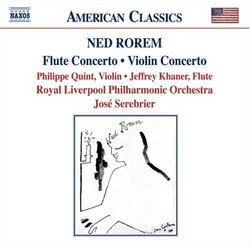

 Track Listings (13) - Disc #1
Track Listings (13) - Disc #1